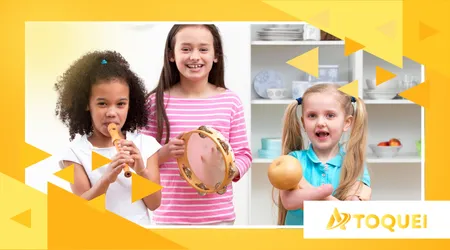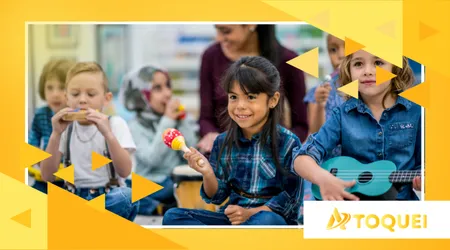Tips for Parents Who Want to Encourage Their Child to Play an Instrument

Encourage your child to play an instrument It goes far beyond simply enrolling you in a music school. It's a journey that can shape your cognition, discipline, and even your emotional intelligence.
Advertisements
Music isn't just entertainment; it's a powerful tool for child development. Studies from the University of Southern California (2023) show that children exposed to musical learning perform better in math, language, and even social skills.
But how can we do this naturally, without excessive pressure or demands? How can we transform this stimulation into something pleasurable and lasting?
The answer lies in the approach. Parents who impose lessons without considering their child's interests may create resistance. Those who cultivate an open and playful musical environment reap more consistent results.
Think of music as a language: the earlier and more organically it's introduced, the more fluent a child will become. And the best part? This learning process can be fun, collaborative, and full of discovery.
Advertisements
We'll explore practical strategies, based on music pedagogy and child psychology, to help your child connect with music in a genuine way.
1. Lead by Example, Not by Pressure
Children are naturally curious and tend to imitate their parents' behavior. If you want encourage your child to play an instrument, show that music is part of your life.
Play the guitar on the weekend, sing while cooking, listen to different genres and discuss them. When music is present in everyday life, children begin to see it as something natural, not an obligation.
A real-life example: Ana, mother of 8-year-old Lucas, always played jazz while cooking dinner. One day, the boy asked, "Mom, what's that different sound like a saxophone?" Curiosity led him to try clarinet lessons, and today he plays in the school band.
++Does the Xalingo Children's Percussion Kit Work in Practice?
Pressure, on the other hand, generates resistance. Phrases like “You will learn piano, period” can create aversion. Instead, try: “How about we figure out how this keyboard works together?”
Music should be a discovery, not a chore. If children associate it with positive moments, interest will emerge naturally.
2. Choosing the Instrument: Let the Child Explore
Some parents make the mistake of choosing an instrument for their children based on their own preferences or the idea that "the piano is the most complete." But what works for one may not work for another.
Take your child to a music store and let them try out different instruments. Physical contact is essential: the weight of the guitar, the softness of the piano keys, the vibration of the drums.
++Group Musical Games for Children Up to 8 Years Old
Example: Carlos, 6, insisted he wanted to learn the drums, but his parents thought it would be too noisy. They insisted on the violin, and he hated it.
It wasn't until they let him try out the drums that he truly got involved. Today, he plays at the local samba school.
Another valuable tip: observe which sounds catch your child's attention. Do they clap along to the music? Sing along to commercials? These are clues as to which instrument might be most appealing.
3. The Right Age? There Is No Hard Rule
Many parents ask themselves: “What is the best age to start?”The answer varies. While the Suzuki method allows children as young as 3 to begin playing the violin, wind instruments require more lung development.
But chronological age isn't the only factor. Interest and emotional maturity also matter. A 5-year-old with musical curiosity can do better than an 8-year-old without motivation.
++How to Create a Mini Band with Simple Instruments at Home
A useful analogy: learning music is like learning to swim. Some children dive in fearlessly at age 4; others need more time to adapt to the water. The important thing is not to force them before they're ready.
4. Teachers Make All the Difference
A good teacher not only teaches techniques but also inspires. Unfortunately, many traditional methods focus on rote repetition, which can discourage children.
Look for instructors with experience in early childhood education. They use games, stories, and play to teach. A study by ABEM (Brazilian Association of Music Education) showed that children learn 40% more when teaching is playful.
Tip: Before enrolling your child, schedule a trial class. See if the teacher adapts the language to the child's age and maintains a light-hearted atmosphere.
5. Routine without Excessive Demand

Consistency is important, but being too rigid can be counterproductive. Instead of imposing hours of practice every day, create a flexible routine.
Example: combine “15 minutes after snack” or “play some music before bed”. Associate the moment with something pleasurable, not a boring obligation.
What if the child doesn't want to practice? Breathe. Pressuring only creates resistance. Ask: “What’s making it difficult today?” Sometimes, all it takes is a change of repertoire or dynamics.
6. Technology as an Ally
Apps like Yousician and Simply Piano use gamification to make learning fun. Sensors detect whether the notes are correct, and children progress through stages, just like in a game.
But be careful not to completely replace human contact. The ideal is to combine technology with live interaction.
7. Celebrate Small Progress
Learning an instrument is a process full of ups and downs. Appreciate every achievement, no matter how small.
Record videos of their first songs, show them to their grandparents, and celebrate when they hit a difficult note. This boosts their musical self-esteem.
8. Bands and Musical Socialization
Playing alone can be lonely. Encourage participation in groups, whether at school or in community workshops.
Interacting with other musicians motivates and teaches skills like teamwork and active listening.
Conclusion: Music as a Gift for Life
Encourage your child to play an instrument It's not just about training a musician, but about offering valuable tools for life.
The discipline of daily practice, creativity in improvisation, artistic sensitivity and the ability to work as a team are just some of the gifts that music offers.
But the real secret lies in balance. Parents who make music a rigid obligation may end up alienating their children from this enriching experience.
Those who cultivate an environment of discovery, patience, and celebration of small achievements are planting the seeds for a lasting relationship with art.
Remember: not every child will become a professional musician, but everyone can benefit from exposure to music.
If today your child learns to play three chords on the guitar, tomorrow he could be composing his own songs or simply using music as a refuge in difficult times.
Want to dive deeper? Five tips to encourage children to study music
Frequently Asked Questions
1. What is the best instrument for beginners?
It depends on the child's interests. Guitar, keyboard, and percussion are more accessible.
2. My child doesn't want to practice. What should I do?
Investigate the reason. It could be the method, the instrument, or just a phase.
3. Do online classes work for children?
Yes, but ideally it should be combined with face-to-face interaction.
4. How many minutes per day are ideal?
Between 15 and 30 minutes, depending on age and disposition.
I hope this guide helps you and your child on this musical journey!
